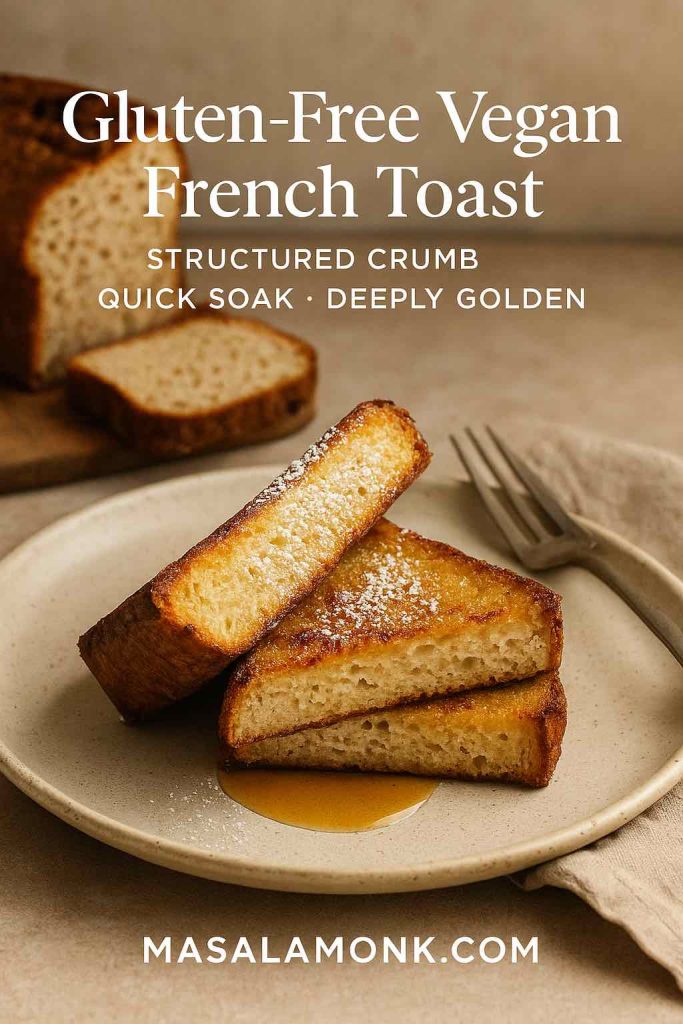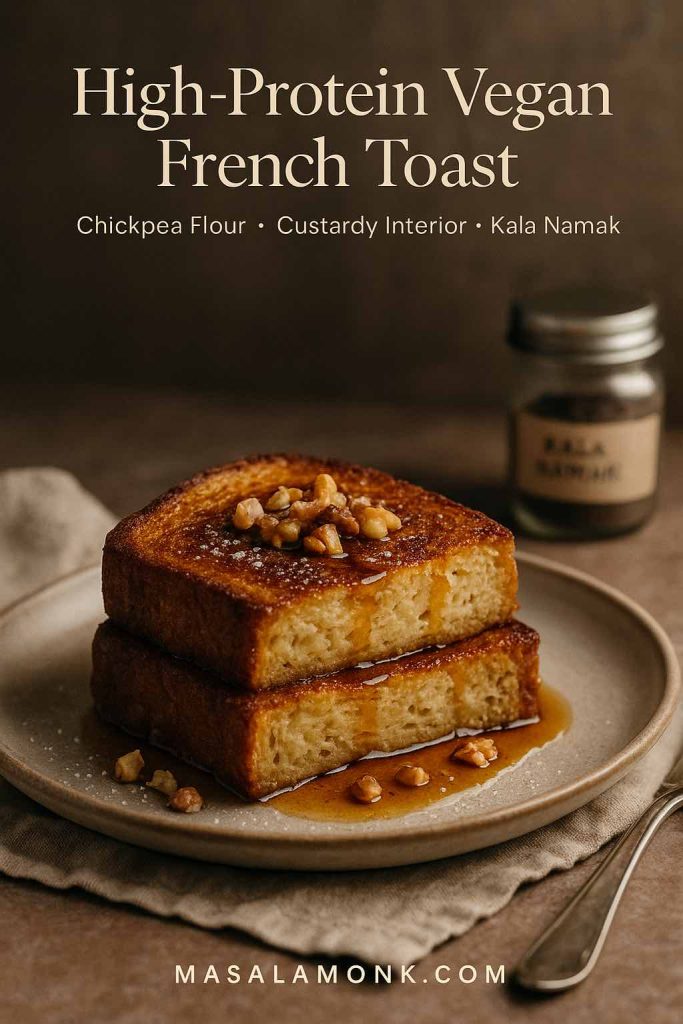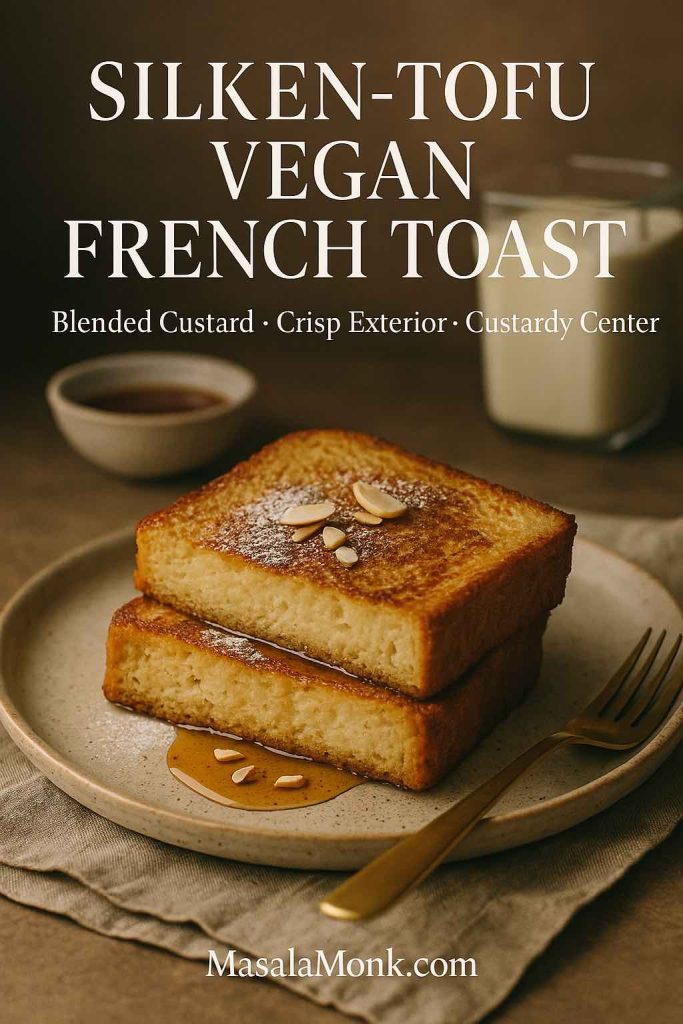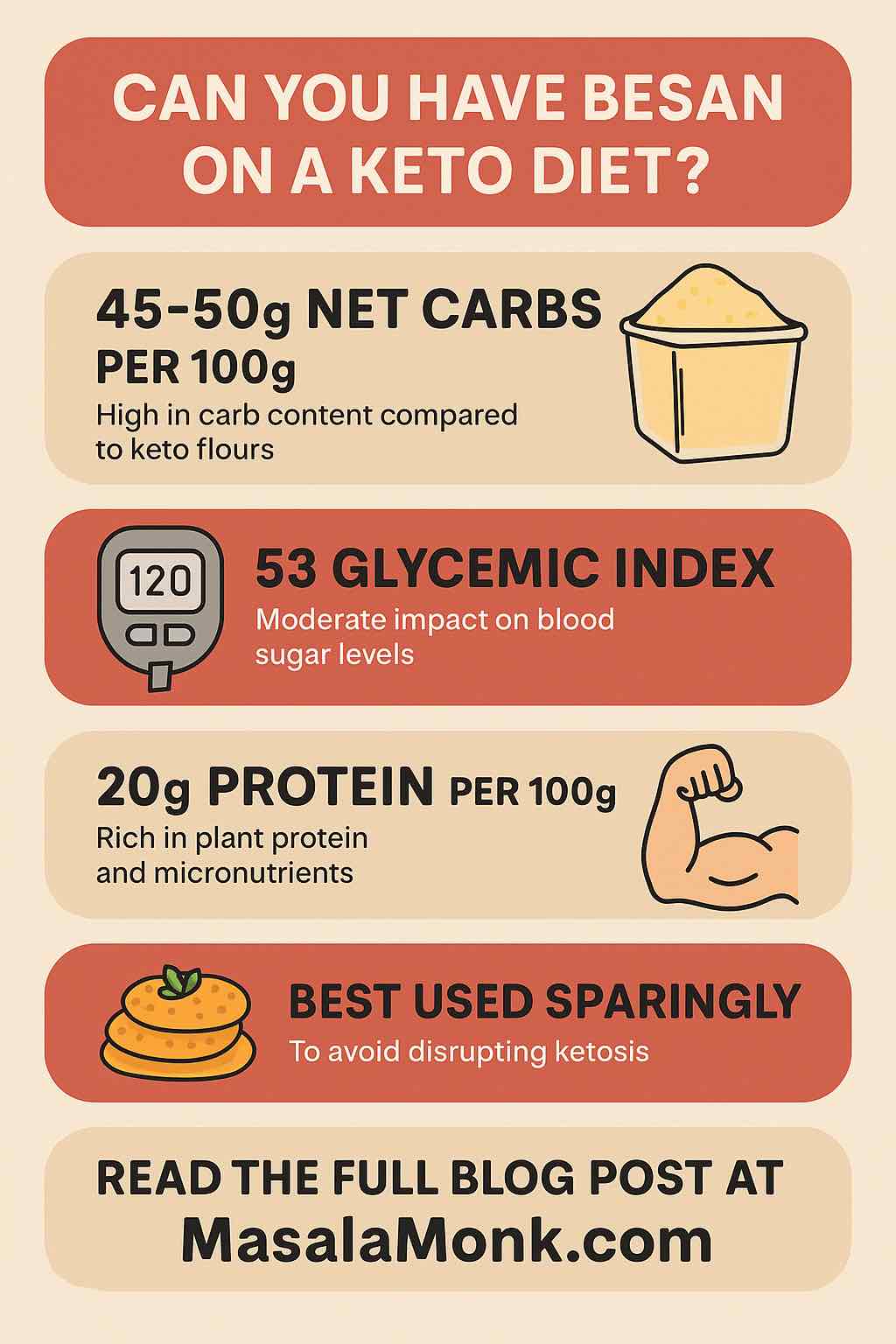
There’s a reason fish and chips never really leaves the cultural conversation. It’s not just comfort food; it’s a texture ritual. You crack through a crisp shell, hit steamy flakes of fish, then chase it with a chip that’s somehow crunchy at the edges and pillowy in the middle. Even when it’s simple, it feels like an event.
At the same time, fish and chips can be stubbornly one-note if you make it the same way every time. The solution isn’t to reinvent the dish into something unrecognizable. Instead, keep the bones of a British-style fish and chips plate—fish that stays juicy, chips that stay crisp—then apply Indian flavor logic in the places where it actually belongs: in the seasoning, in the coating, and in the dips.
That’s what this post is about: fish and chips with Indian twists. The classic stays the hero. The twists simply make the story more interesting.

You’ll still get the timeless cues of traditional fish and chips—the hot oil, the batter, the satisfying crunch. However, you’ll also get five Indian twists on fish and chips that feel natural: a masala-forward version with chaat-style chips, an Amritsari-inspired besan crunch, a tandoori direction that stays crisp, a coastal coconut-lime take, and a punchy chili-garlic twist for heat lovers. Along the way, you’ll see how to handle fish and chips batter without making it heavy, how to keep fried fish and chips crisp after the oil, and how to choose chips that don’t collapse the moment a dip shows up.
If you grew up loving a chip shop plate, you’ll recognize the structure. If you grew up loving pakoras, tandoori grills, chutneys, and masala fries, you’ll recognize the flavor decisions. Put them together and you get a plate that feels both nostalgic and new.
Fish and chips with Indian twists: what stays classic, what changes
Before we cook, it helps to define the boundary lines. Fish and chips works because it has a clean architecture:
- A seasoned fish fillet that stays moist
- A crisp coating that shatters rather than chews
- Chips that are sturdy enough to stay good with salt, vinegar, and sauces

So in this reimagined version, that architecture stays. What changes is the accent system. Indian food doesn’t rely on “one sauce does everything.” Instead, it layers flavor through spice blends, acid choices, aromatics, and dips that bring contrast. When you bring those choices into fish and chips, you get variety without chaos.
In practice, the best Indian twists on fish and chips usually fall into one of three categories:
- Twists in the batter or coating
Think besan, ajwain, curry leaves, or a subtle spice bloom. This is where the crunch can carry flavor. - Twists in the fish seasoning
Tandoori-style yogurt spice, a dry masala rub, or a bright lemon-chili approach. This is where you make the fish itself memorable. - Twists in the dips and chips
Chutney-mayo, spicy yogurt, kara chutney, thecha, or masala chips. This is where you turn “fish and chips” into a full plate.

Because those categories are flexible, you can do five variations without feeling like you’re repeating yourself. Even better, you can keep your kitchen workflow efficient: one base batter, one chips method, then five flavor directions.
Also Read: Keto Hot Chocolate Recipe (Sugar-Free Hot Cocoa) + Best Homemade Mix
British style fish and chips recipe base: the method that keeps everything crisp
A “twist” only tastes as good as the base it sits on. So let’s lock down the base method first, in a way that supports both traditional fish and chips and these Indian twists on fish and chips.
Choosing fish for fried fish and chips (fresh or frozen)
Classic British chips pair well with mild, firm white fish. Cod and haddock are the famous choices, yet plenty of other firm white fish works beautifully. What matters more than the specific species is the thickness and structure of the fillet.
- Thicker fillets give you more forgiveness. They stay juicy while the coating crisps.
- Very thin fillets can overcook quickly, especially if your batter is thick.
- Very delicate fish can flake too soon, which makes battering fiddly.
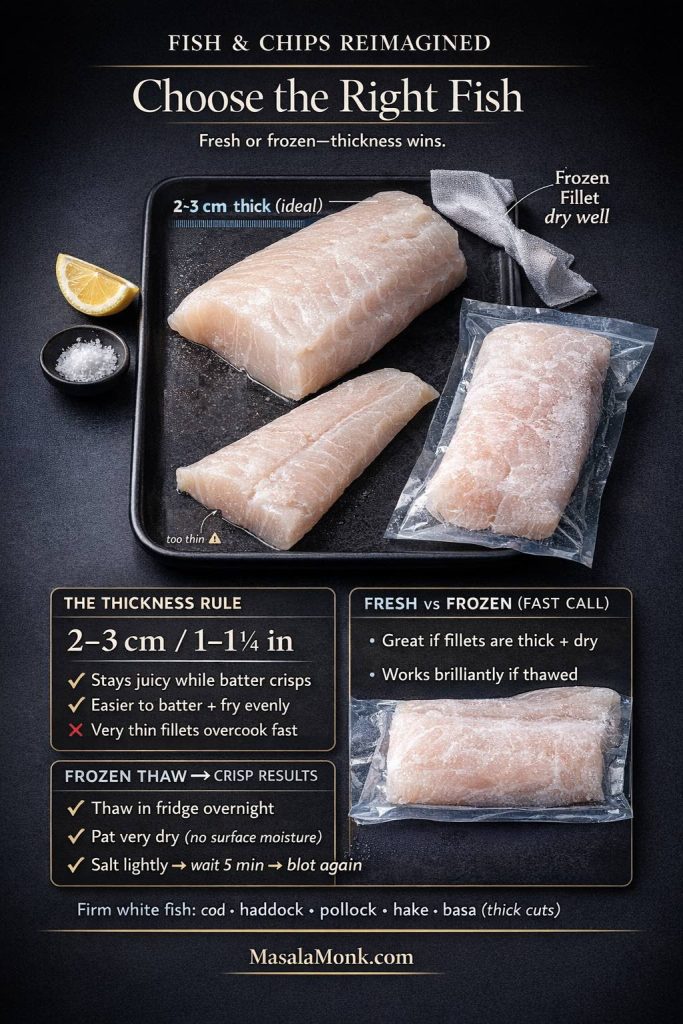
Frozen fish can be excellent for fish and chips, which is why “best frozen fish and chips” gets so much attention. The trick is simply to thaw properly and remove surface moisture. If you thaw fish in the fridge overnight, then blot well before seasoning, you can get results that rival fresh.
When you’re choosing fish for fried fish and chips, thickness beats “fancy.” Aim for fillets that are about 2–3 cm thick so the fish stays juicy while the coating crisps. If cod or haddock is pricey where you live, don’t overthink it—use any firm white fish that holds its shape, then focus on drying the surface well before battering. If you want a quick reference for sensible cod/haddock choices, keep the sustainable cod and haddock guide bookmarked; for easy substitutes when cod isn’t practical, these whitefish swaps are handy.
The real goal of fish and chips batter: light shell, not a thick coat
Fish and chips batter isn’t supposed to taste like bread. It’s supposed to act like a crisp, airy jacket that protects the fish while adding crunch.
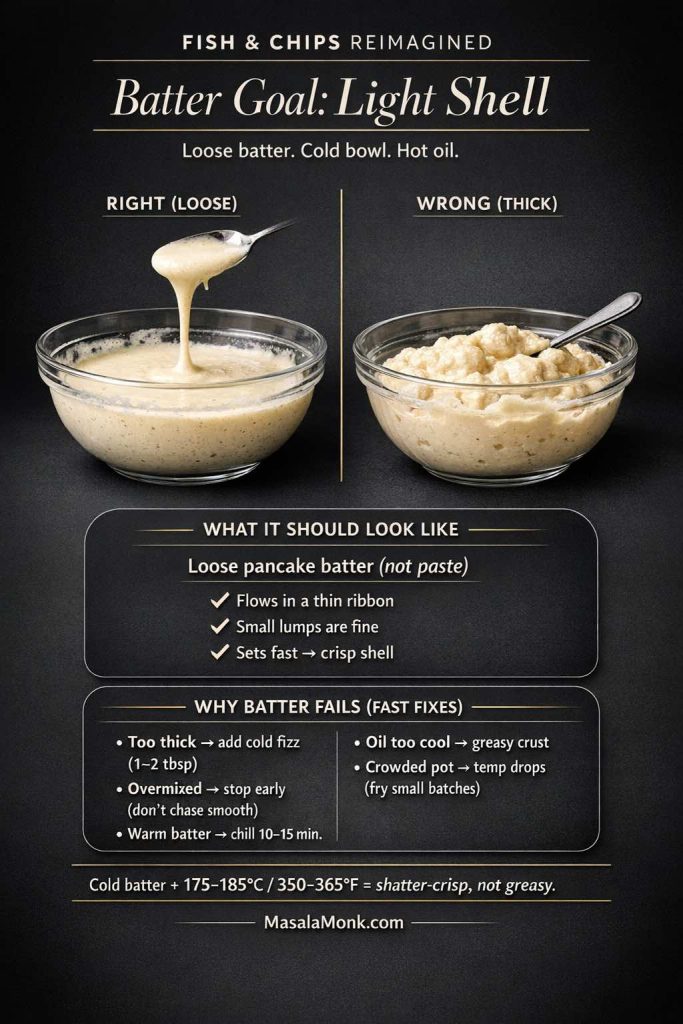
When batter goes wrong, it usually goes wrong in predictable ways:
- Too thick and it becomes bready, sometimes even gummy.
- Overmixed and it becomes tough.
- Warm batter and it absorbs oil more readily.
- Oil too cool and the batter drinks fat instead of crisping.
A good fish and chips batter should look like loose pancake batter, not a thick paste. Mix just until the flour disappears; a few small lumps are fine and actually help keep the crust light. Then chill it while your oil heats—cold batter hitting hot oil sets faster and stays crisper. If you want a classic baseline for batter texture and handling, BBC Good Food’s next-level fish & chips is a solid reference point.
How to make fish and chips batter for Indian twists on fish and chips
You’ll notice that the five variations later will sometimes change the seasoning or flour choices. Still, the core approach stays the same.

Base batter structure (adaptable):
- A flour base (all-purpose flour as the backbone)
- A crisping assistant (a little cornstarch or rice flour)
- Salt
- A cold fizzy liquid (sparkling water or beer)
- Optional lift (a small pinch of baking powder)
The fizzy liquid matters because bubbles help keep the batter airy. Meanwhile, the cornstarch or rice flour helps the crust dry into a crisp shell rather than staying tender.
The biggest reason fried fish and chips turns heavy is temperature drop: too much fish at once pulls heat from the oil, and batter soaks instead of setting. Fry in smaller batches and let the oil return to temperature between rounds. Also, drain on a wire rack, not a plate—steam is what ruins that first-crack crunch. Serious Eats breaks down these fundamentals clearly in their fish and chips recipe, especially the parts about oil temperature and rack draining.
Oil temperature and timing: the hidden backbone of traditional fish and chips
Fried fish and chips is less about “how long” and more about “how hot.” Oil temperature influences everything: crust, greasiness, and how quickly the fish cooks.
Aim for oil that stays in a steady hot zone—around the mid-170s °C / mid-300s °F is a common target. If the oil drops too low after adding fish, the batter will absorb oil before it sets. On the other hand, if the oil is wildly hot, the crust can brown too quickly and the fish won’t have time to cook through.

There’s also an unglamorous detail that makes a huge difference: how you drain. If you put freshly fried fish on a flat plate, steam collects under it and softens the crust. If you put it on a rack, air circulates and the crust stays crisp. Serious Eats calls this out clearly in their approach, and it’s one of those tiny moves that changes the whole result.
Don’t guess doneness by color alone. Fish is done when it flakes easily in thick sections and the center turns opaque, but the cleanest check is temperature: pull it when the thickest part hits 145°F / 62.8°C. That number comes straight from the USDA’s safe temperature chart. Hitting it means the fish stays moist while the crust stays crisp—no dry, cottony fillets.
Also Read: 10 Low Carb Chia Pudding Recipes for Weight Loss (Keto, High-Protein, Dairy-Free)
How to make chips for fish and chips with Indian twists (crisp, sturdy, dip-proof)
Chips are often treated like the sidekick, but in fish and chips they’re half the point. If you want the vibe of old English fish and chips, chips shouldn’t be thin and delicate. They should be thick enough to keep a fluffy center.
Different people use different words here—British chips, English chips, fries, chips—but the key is the cut and the cooking strategy.

The potato choice matters more than most people admit
If you’ve ever made chips that looked golden but tasted hollow, the potato may have been the reason. Some potatoes crisp beautifully; others turn soft too easily.
If you want a quick guide to potato choices for crisp fries and chips, MasalaMonk has a helpful breakdown in these best potatoes for French fries. It’s not just trivia. The potato you choose affects how well your chips survive:
- spice blends
- vinegar or lemon
- chutneys and mayo dips
The simplest chip method for a home kitchen
If you’re not trying to run a chip shop, keep it doable. You can still get the “proper chips” feel with a method that respects the basics:
- Cut thicker batons, not shoestrings.
- Rinse to remove surface starch, then dry extremely well.
- Cook in two stages: a softer cook first, then a crisp finish.

That “two-stage” idea is the backbone of chip-shop chips. You can do it as a double fry if you love deep-frying. Alternatively, you can do a parboil followed by a hot oven or air-fryer crisp stage.
If you’re making chips from scratch, the fastest upgrade is a two-stage cook: a gentler first cook to soften the inside, then a hotter finish to crisp the outside. That second stage is where you win the “proper chip” texture—crisp edges, soft center. If you want a full step-by-step with multiple cut styles and finishes, MasalaMonk’s crispy homemade French fries guide is a good companion piece to keep handy.
Crinkle chips, frozen chips, and the “weeknight fish and chips” reality
Sometimes you’re not in the mood to soak potatoes and baby-sit oil. That’s when crinkle chips and frozen chips earn their keep.
Crinkle chips are especially good for Indian twists on fish and chips because the ridges trap seasoning. They hold onto spice blends and chutney-mayo in a way that smooth chips can’t.

Frozen chips can also work well if you bake them hot, give them space, and finish with a quick crisp blast. The key is to avoid steam build-up. Spread them well, flip halfway, then let them sit briefly on a rack before serving. That short rack rest helps them stay crisp, especially if you’re serving with dips.
If you’re doing chips in an oven or air fryer, treat space like an ingredient. Overcrowding traps moisture and turns crisp edges into soft, steamed potato. Spread chips out, flip once, then let them rest briefly so surface steam escapes before you plate. If you want a quick checklist for the common mistakes that kill crispness, this MasalaMonk guide on air fryer mistakes is worth a skim.
Also Read: Garlic & Paprika Cabbage Rolls (Keto-Friendly Recipes) – 5 Bold Savory Twists
Fish and chips with Indian twists: the five variations that actually make sense
Now the fun part. These five Indian twists on fish and chips are built so they don’t fight the dish. Each one respects the crunch, keeps the fish moist, and adds flavor where it belongs.

To make this feel manageable, think in a modular way:
- One chip method (choose your preferred approach)
- One base batter workflow
- Then you shift flavor through spice blends, coatings, and dips
This keeps the cooking calm instead of chaotic.
Also Read: Eggless Yorkshire Pudding (No Milk) Recipe
1) Masala twist: fish and chips with chaat-style chips and bright spice
If you’re only going to try one variation first, this is the friendliest entry point. It tastes instantly exciting, yet it doesn’t ask you to relearn the technique.
The masala twist works because it uses the chaat playbook: salt, acid, spice, and a little aromatic lift. Done well, it tastes like something you’d genuinely crave, not something you tried once for novelty.

Masala fish and chips batter (spice in the right place)
Here’s the trick: don’t overload batter with harsh chili powders. Instead, build warmth and aroma with small amounts of spices that tolerate frying:
- cumin (roasted if you have it)
- Kashmiri chili for color and mild heat
- a pinch of ajwain for that snack-shop fragrance
- black pepper for bite
Keep the batter cold, mix quickly, and fry hot. The goal is still a crisp shell.
If you want a deeper read on batter mechanics—why some batters stay crisp while others go heavy—Serious Eats also has a helpful explanation of batter and frying principles across their frying guides, and their fish and chips recipe itself remains a strong anchor point: classic fish and chips technique.
Chaat-style chips that still behave like chips
This is where the plate becomes “Indian” without becoming confusing.
Toss hot chips with:
- chaat masala
- roasted cumin
- a pinch of black salt (optional but addictive)
- chili-lime seasoning if you like tangy heat
Because chips are hot, seasoning sticks. Because chips are dry, seasoning tastes vibrant rather than muddy.
The dip that makes the masala twist feel complete
A classic tartar sauce brings creaminess and acid. In this variation, a green chutney mayo does the same job, but with an Indian accent.
For the masala version, think of green chutney mayo as tartar sauce’s louder cousin: creamy base, sharp herbs, bright acid. Blend the chutney until smooth so the dip clings to chips instead of sliding off, then stir into mayo with a squeeze of lemon to keep it snappy. Use MasalaMonk’s green chutney recipe as the base; if you prefer egg-free, their eggless mayonnaise gives you the same rich texture without changing the flavor logic.
This dip is one of those small moves that makes fish and chips with Indian twists feel intentional rather than experimental.
Also Read: Crock Pot Chicken Breast Recipes: 10 Easy Slow Cooker Dinners (Juicy Every Time)
2) Amritsari-inspired twist: besan crunch that feels like a pakora moment
If the masala twist is bright and snacky, the Amritsari direction is deeper and more savory. It borrows the snack DNA of Punjabi fish fry without breaking the fish and chips structure.
This variation is especially satisfying if you love pakoras, because the coating has that familiar besan perfume.

Besan-forward coating: why it works
Besan brings two things:
- a nutty, savory taste that feels instantly Indian
- a texture that can crisp beautifully when supported correctly
The support matters. Besan alone can sometimes go dense. So you bring in a bit of rice flour or cornstarch to encourage crispness.
Season the batter with:
- ajwain (carom) for the signature fragrance
- ginger and garlic for bite
- chili and black pepper for heat
- salt, always
Besan works in fish and chips because it creates a deeper, snack-shop crunch—more like a pakora shell than a neutral batter. The key is balancing it: a little rice flour or cornstarch keeps the crust crisp instead of dense, and ajwain keeps the flavor unmistakably Indian. If you want the quick “what besan does and why it behaves differently,” MasalaMonk’s piece on besan (chickpea flour) is a useful reference.
How to keep this coating crisp, not heavy
Besan batters reward restraint. Mix until combined, then stop. Keep the batter cold. Fry in small batches.
Drain on a rack, then serve quickly. That last part matters because besan crusts are at their best right after frying—when they’re crisp and fragrant.
Dip options that respect the Amritsari vibe
Instead of a mayo-heavy dip, you can go in a slightly lighter direction:
- A spicy yogurt dip with lemon and roasted cumin
- A green chutney side (or green chutney yogurt)
- A tangy peanut chutney for a rich but non-mayo option
Peanut chutney is a smart partner for fried fish because it brings creaminess without turning the plate heavy. It also holds up against heat and spice—so it won’t disappear next to an Amritsari-style coating. Serve it thick enough to scoop with chips, then loosen with a spoon of water or yogurt only if you want it drizzly. MasalaMonk’s tangy spicy peanut chutney is a great starting point.
3) Tandoori twist: fish and chips with a tandoori-style flavor layer that still stays crisp
Tandoori flavors are bold, yet they can sabotage crispness if you apply them the wrong way. Yogurt marinades are moist; moisture is the enemy of crunch. So you handle it with a little strategy.
This twist is about getting the taste of tandoori fish with the satisfaction of fish and chips.

How to do the tandoori layer without soggy batter
Marinate fish in a thick yogurt spice mix—enough to flavor the fish, not so much that it drips.
Then, before coating or frying:
- wipe off excess marinade gently
- give the fish a light dusting of starch (rice flour or cornstarch)
From there, you have two good paths:
- Light batter path
Use a thinner fish and chips batter and let the fish carry the tandoori identity. - High-heat roast + crisp finish path
Roast at high heat to set the tandoori coating, then finish with a quick crisp stage (hot oven or a brief dip in oil) if you want extra crunch.
Either way, the fish stays juicy and the exterior stays crisp enough to feel like traditional fish and chips, just louder.
Dips that match the tandoori direction
A tandoori mayo is the obvious crowd-pleaser, especially for people who love creamy dips. Start with a mayo base, then add tandoori spice and lemon.
Tandoori mayo works because it mirrors the fish: warm spice + lemony brightness, softened by creaminess. Stir tandoori masala into mayo, add lemon, then taste for salt—mayo can mute seasoning, so it usually needs a little more spice than you expect. If you want a flexible base recipe to build different mayo dips from, MasalaMonk’s homemade mayonnaise guide
For a lighter pairing, a lemony yogurt dip works brilliantly because it echoes the marinade without doubling down on heaviness.
Also Read: Sourdough Starter Recipe: Make, Feed, Store & Fix Your Starter (Beginner Guide)
4) Coastal coconut-lime twist: crunch that feels South Indian and still belongs on the plate
This is the variation that feels genuinely fresh, especially if you’ve made fish and chips the same way for years. Coconut adds a sweet, nutty crunch. Lime adds brightness. Chili adds the necessary bite.
However, coconut can burn quickly in hot oil, so you want a coating strategy that protects it.

Two ways to build the coconut crunch
Option A: Coconut crumb coating
Combine:
- shredded coconut (fine, not long strands)
- rice flour (helps with crispness and browning control)
- crushed curry leaves (optional but incredible)
- salt, chili, a touch of black pepper
Then coat fish lightly so coconut doesn’t form a thick layer.
Option B: Coconut in the “after” stage
If you’re nervous about coconut browning too quickly, keep the batter classic, then finish with toasted coconut and curry leaves sprinkled over the fish right before serving. This keeps the crunch aromatic rather than risky.
Chips pairing ideas that fit the coastal vibe
Coconut-lime fish loves a chip that can carry bright seasoning without turning soggy. Crinkle chips are great here because the ridges grab onto chili-lime salt and stay punchy even after dipping. If you’re cutting potatoes yourself, go for thick British-style chips—fluffy inside, crisp outside—then finish with lime zest, a squeeze of lime, and a clean salt. The result tastes coastal and fresh, not heavy.
If you want a playful swap, banana chips can echo the coastal snack energy, yet that’s optional. If you do it, treat banana chips like a crunchy side element, not as a replacement for every chip on the plate.
Dip pairing that makes coconut feel balanced
A spicy chutney works better here than a heavy mayo. MasalaMonk’s kara chutney is a strong match because it’s built for savory snacks. Meanwhile, a limey yogurt dip also works beautifully if you want something calmer.
Also Read: How to make No-Bake Banana Pudding: No Oven Required Recipe
5) Chili-garlic twist: fish and chips with heat that doesn’t taste harsh
This final variation is for people who want a punch. The mistake many cooks make is pushing heat into the batter itself. Fried chili powders can taste bitter if overused, and batter can amplify that harshness.
So instead, keep the batter relatively classic and bring heat through a condiment that’s meant to be intense.

Thecha-style heat: sharp, alive, and addictive
Thecha is one of those condiments that instantly makes fried food feel exciting. It’s punchy, garlicky, and alive in a way that bottled hot sauces sometimes aren’t.
Thecha belongs here because it gives you “fresh heat,” not just heat—garlic bite, chili sharpness, and that addictive, slightly coarse texture that makes you keep dipping. Spoon it on the side for chips, or swirl a little into mayo when you want the burn softened and creamier. Use MasalaMonk’s thecha recipe as your base.
How to serve the chili-garlic twist so it feels balanced
Keep the fish and chips base classic:
- crisp batter
- well-salted chips
Then offer thecha in one of two ways:
- on the side as a dip for chips
- swirled into mayo for a creamy heat sauce
This gives readers control. Some people want a gentle kick; others want the full fire.
If you want a heat option that feels more familiar than thecha, a simple chili sauce or pepper sauce works brilliantly with chips—especially for the “chili-garlic” twist. Keep it bright (vinegar or citrus), not syrupy, so it cuts the richness instead of adding weight. MasalaMonk’s pepper sauce guide gives you several directions depending on whether you want smoky, sharp, or fruity heat.
Also Read: Chicken Adobo — Step-by-Step Recipe — Classic Filipino Adobong Manok
Dips that make fish and chips with Indian twists feel complete
A great fish and chips plate often comes down to contrast: hot vs cool, crisp vs creamy, salt vs acid. Dips are the easiest way to control that contrast.
Instead of treating dips like an afterthought, treat them like the finishing move.

Green chutney mayo (bright, creamy, classic-friendly)
This is the most universal dip in the lineup. It behaves like tartar—cool and creamy—yet tastes unmistakably Indian.
Start with MasalaMonk’s green chutney and swirl it into mayo. If you want egg-free, MasalaMonk’s eggless mayonnaise gives you the same creamy base.
Kara chutney (spicy South Indian dip energy)
Kara chutney is especially good with the coastal coconut-lime twist because it’s sharp, spicy, and built for savory snacks—exactly what fried food wants. Serve it thick and punchy for dipping, or thin it slightly for drizzling over fish right before serving. MasalaMonk’s kara chutney recipe fits the flavor direction perfectly.
Tangy peanut chutney (creamy without mayo)
If you want a dip that’s creamy but not heavy, peanut chutney is a strong move. MasalaMonk’s tangy spicy peanut chutney is especially useful because it’s snack-friendly and balanced.
Thecha (sharp heat for chips and fish)
If you like heat that feels alive—garlic bite, fresh chili punch, and a slightly coarse texture—thecha is the dip that makes chips disappear fast. Spoon it on the side for dunking, or swirl a little into mayo when you want the burn softened and creamier. Use MasalaMonk’s thecha recipe as your base, then adjust the chili level to match your tolerance.
Also Read: Sweetened Condensed Milk Fudge: 10 Easy Recipes
Bringing it all together: a calm workflow for a dramatic plate
Fish and chips can feel like a juggling act because you’re managing hot oil, batter, and timing. Meanwhile, adding five Indian twists on fish and chips might sound like extra complexity. In reality, the twists are mostly seasoning decisions.
Here’s a workflow that keeps you sane:
- Choose your chip path first
If you’re doing thick chips from scratch, start them early. If you’re doing frozen chips or crinkle chips, you can start later. - Prep dips while chips cook
Chutneys and mayo mixes can be done in minutes. They also taste better when they sit briefly. - Season fish and prepare batter last
Batter hates waiting. Fish benefits from a few minutes of seasoning, yet you don’t want it sitting wet too long. - Fry fish in small batches and drain on a rack
This is the crispness move that makes fried fish and chips taste like it came from a proper shop.

As you cook, remember that even old English fish and chips was never just “fried fish and potato.” It was always about timing, texture, and salt. The Indian twists simply give you new ways to build that same satisfaction.
Also Read: Peanut Butter Fudge: Recipes & Guide (8 Methods + Easy Variations)
A few details that quietly upgrade every version
Some upgrades are loud, like coconut-lime crust. Others are quiet, yet they change everything.

Salt timing matters more than salt amount
Salt chips while they’re hot. Also salt the fish while it drains. Because salt is not just seasoning here; it’s part of the crunch experience.
Acid doesn’t have to be vinegarx
Traditional fish and chips often comes with vinegar, yet Indian twists on fish and chips can use other acids:
- lemon wedges
- a squeeze of lime
- a tamarind dip
- a chutney with brightness
Acid wakes up fried food. It’s what stops the plate from feeling heavy.
Oil choice and care keeps flavors clean
If your oil tastes tired, everything tastes tired.
Clean-tasting oil is the difference between “crispy” and “heavy.” Choose a neutral oil that can handle high heat, keep the temperature steady, and strain out burnt bits between batches—those little fragments are what make oil taste bitter. If you want a simple breakdown of oils and heat behavior, MasalaMonk’s cooking with oils guide is a helpful companion.
The “don’t crowd the fryer” rule is non-negotiable
Crowding drops oil temperature. Then batter absorbs oil. Then crispness disappears. Even if you’re using a fish and chip fryer at home, small batches win every time.
Also Read: Sourdough Recipe: 10 Easy Bread Bakes (Loaves, Rolls & Bagels)
Why these Indian twists still respect traditional fish and chips
It’s easy to throw spices into a classic and call it a twist. It’s harder to keep the classic soul intact. That’s why each variation here follows a simple rule: the spice should enhance the crunch ritual, not compete with it.
- The masala twist plays nicely with chips because chaat logic was designed for snacks.
- The Amritsari besan twist works because pakora logic was designed for frying.
- The tandoori twist works because the fish itself can carry spice without burdening the batter.
- The coconut-lime twist works because South Indian snack flavors already pair with seafood.
- The chili-garlic twist works because condiments like thecha were built for crisp foods.
So you still get the plate you want. You simply get five different moods of it.
Also Read: 10 Vegan Chocolate Cake Recipes (Easy, Moist, & Dairy-Free)
A quick note on credibility sources that support the crispness mechanics
When you’re making fish and chips at home, small technique decisions add up. If you ever want to cross-check the classic baseline method—oil temperature, batter texture, rack draining—Serious Eats is a strong reference: classic fish and chips recipe. Likewise, BBC Good Food’s method is useful for batter discipline and “don’t overmix” cues: next-level fish & chips.
Meanwhile, for a clean, confidence-building doneness reference, the USDA’s safe temperature chart is straightforward and reader-friendly.
These sources aren’t here to complicate your cooking. They’re here because a crisp fish and chips batter behaves according to physics, not vibes. When you understand the cues, you stop guessing.
Also Read: Kahlua Drinks: 10 Easy Cocktail Recipes (Milk, Vodka, Coffee)
Closing: choose your twist, keep the ritual
Fish and chips doesn’t need saving. It needs remixing. The ritual—crisp crust, juicy fish, sturdy chips—still hits every time. Yet once you start treating the plate as a canvas, you get variety without sacrificing what makes it lovable.

Start with the masala twist if you want instant payoff. Go Amritsari if you want that pakora crunch. Choose the tandoori direction when you want smoky warmth. Pick coconut-lime when you want coastal brightness. Bring in thecha when you want heat that feels alive.
Either way, you’re not abandoning traditional fish and chips. You’re keeping it—and giving it five Indian twists that feel like they belonged there all along.
Also Read: Hot Chocolate Coffee: 3 Easy Recipes (Cocoa, Mix, or Espresso)
FAQs
1) What makes fish and chips with Indian twists different from traditional fish and chips?
Fish and chips with Indian twists keeps the classic structure—crisp battered fish and sturdy chips—while shifting the flavor through Indian spice blends, chutney-style dips, and seasonings like chaat masala or chili-lime. In other words, it’s still traditional fish and chips at heart, just reimagined with bolder aromatics and brighter finishes.
2) Is this still British style fish and chips if I use Indian spices?
Yes. British style fish and chips is defined by technique and texture: a light fish and chips batter, hot oil, and proper draining so the crust stays crisp. Indian spices simply change the seasoning profile, not the essential method.
3) How do I keep fish and chips batter light and crispy?
Start with cold batter and mix only until combined—overmixing makes the coating tougher. Also, fry in small batches so the oil stays hot; otherwise the batter absorbs oil before it sets. Finally, drain on a rack instead of a plate so steam doesn’t soften the crust.
4) What’s the best oil temperature for fried fish and chips?
A steady, hot frying temperature is key. If the oil is too cool, fried fish and chips turns greasy; if it’s too hot, the coating browns before the fish cooks through. Aim for a consistent medium-high frying heat and let the oil recover between batches.
5) How do I know when fried fish and chips is done without a thermometer?
Look for a deep golden crust and fish that flakes cleanly in the thickest part. The center should be opaque and moist, not translucent. If the fish resists flaking, give it a short extra fry and let it rest briefly so carryover heat finishes the middle.
6) Can I use frozen fish for fish and chips with Indian twists?
Absolutely. Frozen fillets can work beautifully as long as they’re fully thawed and blotted dry. Excess surface moisture is the main reason batter slides off or turns soft, so drying the fish well matters more than whether it started fresh or frozen.
7) What’s the best frozen fish and chips approach for a quick dinner?
Use thicker frozen fish fillets and thicker-cut chips, then focus on crisping: cook at high heat, avoid crowding the tray, and let everything rest briefly on a rack. That short rest helps moisture escape, which keeps the coating and chips from softening.
8) What are the best chips for fish and chips with Indian twists?
Thick British chips (chunkier cuts) stay fluffy inside and hold up to dips. Meanwhile, crinkle chips are excellent for Indian twists on fish and chips because the ridges trap masala seasoning and stay flavorful even after dipping.
9) Why do my chips go soggy next to fish and chips?
Usually it’s steam. If chips are piled in a bowl or covered, trapped moisture softens them fast. Spread chips out, salt while hot, and keep them uncovered until serving. Similarly, drain the fish on a rack so it doesn’t steam the chips on the plate.
10) Can I bake fish and chips with Indian spices instead of frying?
Yes, although the texture changes slightly. Baking can still be satisfying if you dry the fish well, use a lighter coating, and cook at high heat. For chips, thicker cuts and adequate spacing on the tray help a lot.
11) Can I air-fry fish and chips with Indian twists?
You can, especially if you use a coating designed for air frying rather than a wet batter. For chips, avoid overcrowding and shake/flip midway. Air frying tends to reward smaller batches, so cooking in rounds often gives better crispness.
12) What’s the best fish for fish and chips if I can’t get cod or haddock?
Choose any firm, mild white fish that holds together—thicker fillets are more forgiving. The key is even thickness so the fish cooks through while the batter crisps, which matters whether you’re making British style fish and chips or fish and chips with Indian twists.
13) How do I make an Amritsari-style fish and chips batter?
Use besan (gram flour) as the main flour, then add a crisping helper like rice flour or cornstarch. Season with ajwain, ginger, garlic, chili, and black pepper. Keep the batter cold and fry hot so it sets quickly and stays crunchy.
14) How do I get a tandoori twist without ruining crispness?
Keep the tandoori flavor in the fish (spiced yogurt marinade), then wipe off excess marinade before cooking. After that, either use a lighter batter or a dry coating. This way you get the aroma of tandoori seasoning while preserving the crisp bite of fish and chips.
15) What dips go best with Indian twists on fish and chips?
Chutney-style dips are a natural match: mint-coriander, tamarind sweet-heat, spicy yogurt, or chili-garlic dips. They play the same role as tartar sauce—cooling, brightening, and adding contrast—while making the plate feel distinctly “twisted.”
16) How do I reheat fish and chips and keep it crispy?
Skip the microwave. Instead, reheat in a hot oven or air fryer until the crust re-crisps. Keep the fish and chips separated on a rack or perforated tray so hot air can circulate and moisture can escape.
17) Why does fish and chips batter fall off the fish?
It usually happens when the fish is wet or the coating has nothing to cling to. Pat the fish very dry, dust lightly with flour or starch before dipping into batter, and avoid letting battered fish sit too long before frying.
18) Can I make fish and chips with Indian twists ahead of time for guests?
You can prep almost everything: cut potatoes, mix spice blends, and prepare dips in advance. Then, fry or bake close to serving time for best texture. If needed, keep fried fish warm on a rack in a low oven so it stays crisp until you’re ready to plate.





